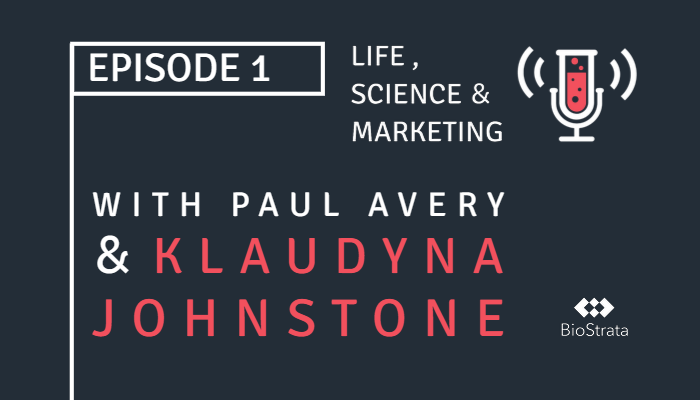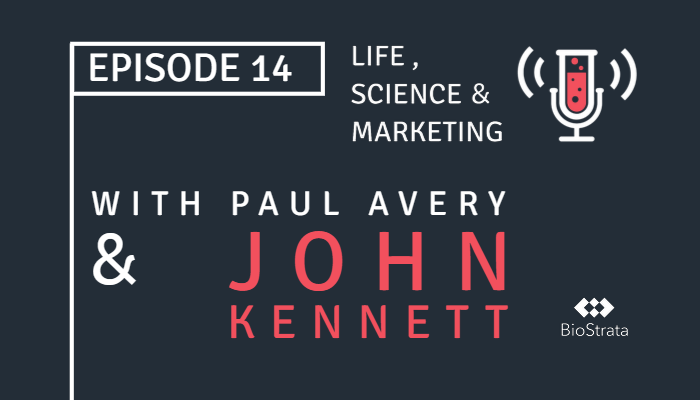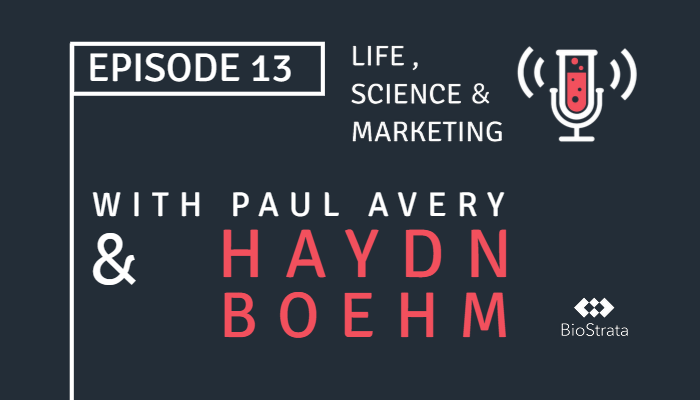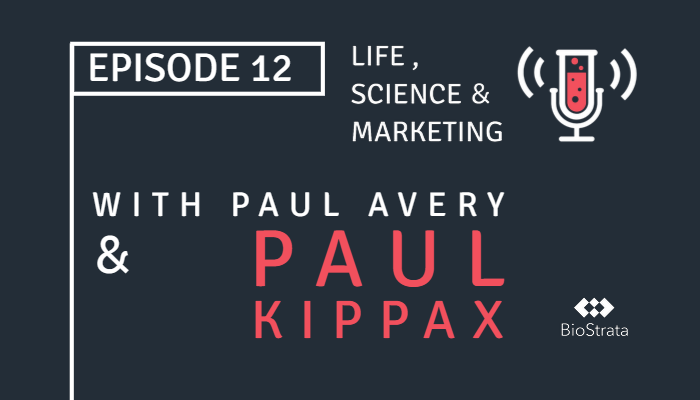Klaudyna Johnstone: Behavioural secrets, AI for pathology, working in scaleups, and localising campaigns for global success
We're excited to announce the launch of our brand new podcast, "Life, Science and Marketing". Airing every other week, our CEO, Paul Avery, engages in insightful conversations with leading science marketing experts from across the globe, delving deep into their life and career story, the areas of science that inspire them, and the marketing tips and tricks they have learned along the way.
Our aim is to provide life science marketers with the perfect resource to help them navigate the ever-changing and competitive landscape of our industry. We're hoping to arm you with industry-leading perspectives, expert insights, and innovative strategies, so you can stay ahead of the curve. The right knowledge can inspire informed decision-making, leading to the development of game-changing marketing strategies that can propel your company towards success.
In our first episode, we're delighted to share an enlightening conversation with Klaudyna Johnstone. Boasting a strong scientific background, Klaudyna earned her degree in genetics from the University of Nottingham and an MRes in Biomedicine from University College London. She has since held various roles in life science marketing, including positions at companies like Expedeon, Sphere Fluidics, and Camerus. Today, she leverages her expertise in her current role as the Marketing Director at Source Bioscience. Her chat with Paul touches on her career journey, the challenges and learnings of working in scale-ups, her passions, and the captivating intersection of behavioural science and marketing.
Continue reading for a summary of episode 1. Alternatively, if you’d prefer, you can immerse yourself in the full podcast episode below or subscribe on your favourite podcast platform.
Could you share with our audience your journey? How did you get to where you are today?
Klaudyna Johnstone: My interest in this field began when I was 15, sitting in my science classroom watching a BBC documentary on the human genome project. That was a turning point for me. Fast forward a few years, and my passion led me to pursue academic studies in genetics and biomedicine. However, I always knew that my strengths weren't strictly academic. I was intrigued by the commercial world and how private organisations functioned. With a combination of ambition, research, and a bit of luck, I landed my first role as a marketing coordinator for a startup on the research campus in Cambridge. I was fortunate to meet talented mentors who have guided me throughout my journey.
Can you tell us about the challenges and learnings from working in scale-ups?
Klaudyna Johnstone: Working in scale-ups is interesting. It provides the perfect balance between a blank page startup environment and a structured organisation. The challenges, in turn, often become opportunities. The operational element that comes into play with marketing in a scale-up environment is quite significant. In the earlier stages, you can't immediately deploy advanced marketing tools, like CRMs such as HubSpot. You need to start more basic and know which direction to build in. Despite the challenges, it is a rewarding journey.
What are you passionate about outside of work?
Klaudyna Johnstone: Between my professional life and being a parent to two young kids, the other activity that I manage to squeeze in is high-intensity interval training (HIIT). I find that I stick to regular exercise best when it's in a small group setting with someone "encouraging" me in real life.
Could you share about an interesting scientific area you've worked in or a specific product that excited you from a science perspective?
Klaudyna Johnstone: I've been fortunate to work on a variety of interesting technologies, from single-cell analysis instrumentation based on microfluidic technology to treatment options for opioid dependence. However, my current passion lies in the field of digital pathology and AI. We're at the cusp of an explosion of AI in most industries, and it's exciting to be a part of that. Our work involves helping healthcare bodies, such as NHS hospitals and private healthcare organisations, digitize their cellular diagnostic processes. This involves scanning samples with ultra-high-resolution scanners, which can then be shared with anyone in the world for second opinions or multidisciplinary team meetings. Moreover, AI can help speed up these diagnostic processes, leading to faster treatment access for patients.
Could you elaborate on the role AI is going to play in this?
Klaudyna Johnstone: AI has several potential areas of application. For instance, AI can be used for triaging cases. It can rapidly examine all samples and guide pathologists on which ones need immediate attention and which are likely benign. AI isn't necessarily making the diagnosis itself but streamlining the process. In the future, AI might even be used as a first port of call, where it can make a recommendation for an actual human pathologist to verify or comment on. As the NHS workforce is under pressure, AI could help relieve some of the strain by speeding up the processes.
Could you tell us more about your passion for the power of behavioural science in marketing?
Klaudyna Johnstone: Behavioural science, especially when applied to marketing, is a fascinating field. People often believe that their everyday choices are made logically, but these decisions are often driven by subconscious biases. Even if we're aware of these biases, that doesn't mean we can overcome them. There's a wealth of studies and insights that marketers can learn from and apply to their own work. In my field, which often involves novel technologies, figuring out the right message, audience, and delivery channel can be particularly challenging. That's why I believe in testing and learning from others. Rather than aiming for absolute perfection right off the bat, it's essential to test your approach and refine it based on the results.
Can you share some specific applications or examples where behavioural science has made a significant impact?
Klaudyna Johnstone: Well, behavioural science in marketing isn't about reinventing the wheel. It's about understanding human psychology to improve the effectiveness of your strategies. It could be as simple as understanding how scarcity impacts decision-making, and using that to create a sense of urgency around a product or offer. Or understanding cognitive biases such as confirmation bias or anchoring bias, and creating content that either works with or counters those biases. Essentially, it's about making your message more resonant with your audience, making it easier for them to understand, and more compelling to act upon.
Do you believe that this understanding of behavioural science gives you an edge in the life sciences sector?
Klaudyna Johnstone: Yes, I believe so. The life sciences sector often involves complex and novel technologies. Understanding behavioural science can help craft messages that resonate more effectively with our target audiences. By making our messaging more aligned with how our audience thinks and feels, we can create more engaging and persuasive communications. This can be particularly powerful in an industry where the technologies and concepts can often be difficult for non-experts to grasp.
What would be your advice to others looking to blend behavioural science with their marketing efforts?
Klaudyna Johnstone: Firstly, I would encourage them to read and learn from the vast array of resources available. There are plenty of studies and books available on the subject that can provide valuable insights. Secondly, it's important to test these theories in your own marketing campaigns. The effectiveness of these techniques can vary depending on your specific situation and audience, so testing and refining is key. Finally, don't get tangled up in aiming for absolute perfection. It's better to launch and learn from real-world results than to endlessly iterate before launch in pursuit of an unattainable ideal.
You recently implemented a new campaign at your current organisation, focusing on geographical expansions. Could you elaborate more on that and why it stands out as a favourite?
Klaudyna Johnstone: This campaign involves expanding a service that we're well known for, which has been established for nearly 20 years, into new geographical territories. This process is intriguing because we must tweak our successful model to accommodate different geographies. Recently, we expanded our Sanger sequencing to the north of the UK. Despite the similarities between regions, different messaging is needed for different audiences. Tweaking the subtleties is something I really enjoy.
Could you give us a more extreme example of localisation in marketing campaigns?
Klaudyna Johnstone: In my previous organisation, a global company, we sequentially launched a product globally. We started out in different countries and expanded across different territories as we got regulatory approval. Despite it being the same product with the same clinical benefits, presenting it in different countries and geographies requires a whole art of localising the campaign. This includes translation into different languages, considering reimbursement models, perception, market size, and how end users are likely to come across the product.
Do you have a key marketing tip that you'd pass on to other marketers, especially those starting out in their career?
Klaudyna Johnstone: My biggest piece of advice would be to never stop learning. The field of life science marketing is moving so quickly that even a few months can make a huge difference. With technologies advancing, competition stiffening, and marketing tools evolving, staying updated is essential. This learning doesn't have to be structured. You don't need a new degree to progress your career. Podcasts, webinars, and networking events can provide a wealth of educational information. Sifting through this information to find what's most useful can be a bit of a challenge, but it's definitely worth it.
Discover more insights with the Life, Science & Marketing Podcast
As we conclude this discussion with Klaudyna Johnstone, we'd like to thank her for sharing her wisdom and experiences. Klaudyna is always keen to engage in further discussions, answer questions, and share more about her journey and expertise (you can find her on LinkedIn and Twitter). Alternatively, you're welcome to reach out to her via email at hello@johnstone.bio.
Remember to stay tuned for the next episode of "Life, Science and Marketing". We're excited to bring you more insightful discussions and actionable advice from leading experts in our field.
You can also follow the official Life, Science and Marketing LinkedIn page to keep up-to-date with the latest podcast news and episodes.




